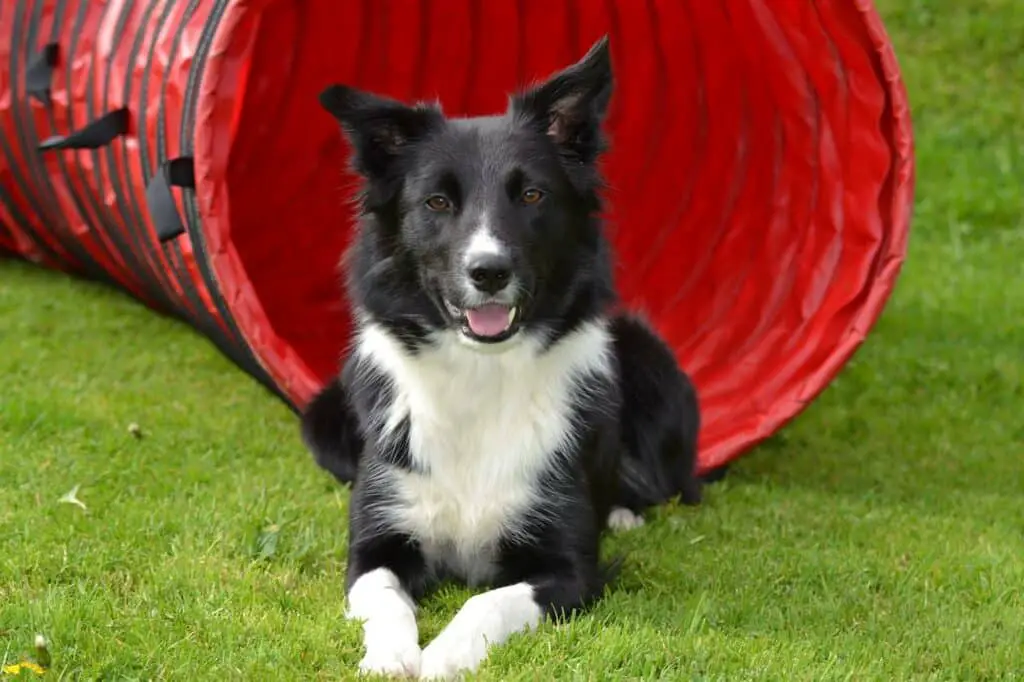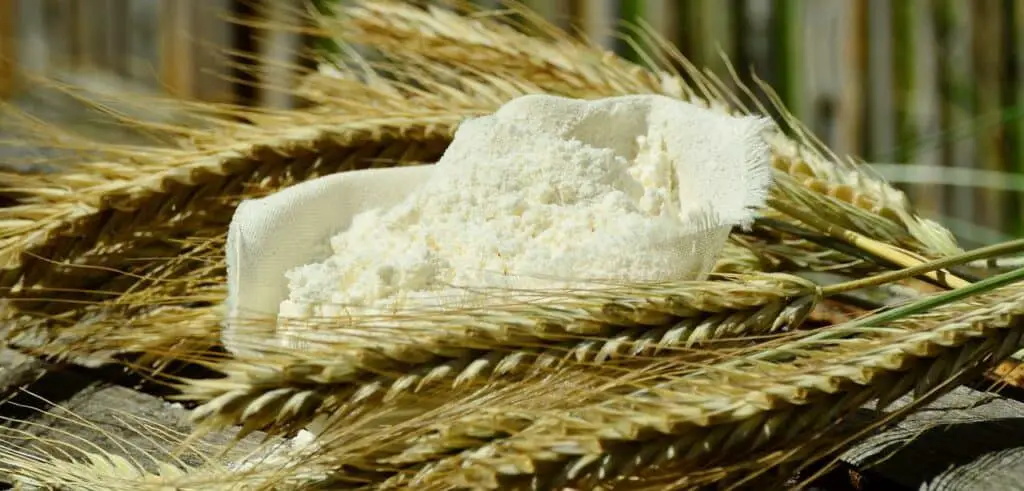Flour is a significant ingredient in most dog treats and foods.
Therefore, if you are fond of making your furry friend’s treats at home, you’ve probably wondered if the flour is safe for them or not every time you do so.
So can dogs eat flour?
Yes, but within limits.
Flour is not toxic to these canines.
However, some flours are beneficial for dogs, while others are processed and lack essential supplements.
Thus, it is crucial to identify which ones are suitable for them and those that aren’t.
This article will discuss the different varieties of flour and their benefits or harm to your four-legged friend.

Suitable flours for dogs
Whole grain flours
If your dog doesn’t have a sensitive stomach and can tolerate wheat, these are the best flours because they contain more nutrients than their counterparts.
Whole grain flours that are safe for dogs include:
- Whole wheat flour
This is the best flour for making dog treats.
It is made by grounding whole wheat kernels and thus, contains all the nutrients in the grain.
These supplements include manganese, selenium, fiber, copper, carbohydrates, and vitamins B and B9.
Whole wheat flour is also readily available, but the only setback is that it is not gluten-free.
Therefore, you will have to resort to other safe alternatives if your pooch is gluten allergic.
- Brown rice flour
This flour is made by crushing unhulled brown rice grains meaning that it has various nutrients like zinc, folate, and calcium.
It is also gluten-free hence perfect for pups with sensitive stomachs.
That said, this flour is a great, healthy alternative to white flour, which has close to zero nutrients.
- Quinoa flour
Apart from being gluten-free, this flour is filled with manganese, magnesium, phosphorous, zinc, and iron.
It also contains the nine essential amino acids responsible for building neurotransmitters, proteins, and hormones in dogs’ bodies.
- Buckwheat flour
Buckwheat flour is made by grounding whole wheat seeds, making it rich in fiber which will protect your dog’s digestive system.
Aside from that, it contains phosphorous, Vitamin B6, and potassium, improving your pup’s health and enhancing weight loss.
- Sorghum flour
This flour is rich in antioxidants, iron, and B12.
It also reduces inflammation, balances dogs’ blood sugars, and is a great alternative source of protein for lactose intolerant pups.
- Oat flour
Oat flour contains phosphorous, vitamin B1, folate, fiber, protein, calcium, thiamin, riboflavin, and iron.
All dogs can comfortably consume this flour as it is also gluten-free.
Nongrain flours
These flours are healthier and kinder alternatives for dogs with sensitive stomachs and wheat allergies.
They include:
- Pumpkin seed flour
Pumpkin seed flour is made from crushing hulled pumpkin seeds hence nutritionally dense.
It contains iron, zinc, manganese, vitamin B, copper, magnesium, and omega 3, promoting your dog’s skin, bone, cell, and heart health.
- Coconut flour
This flour is gluten-free and low in carbs, thus helping these canines lose weight quickly. In addition to that, its minerals, proteins, and vitamins stabilize dogs’ blood sugars.
- Almond flour
Besides being low in carbs, this flour is filled with nutrients like copper, magnesium, copper, manganese, protein, phosphorous, and vitamin E.
Furthermore, it has a slightly sweeter taste than regular flour, thus more enjoyable for dogs.
- Chickpea flour
Chickpea flour contains more proteins, minerals, vitamins, and fiber than regular flour, making it a healthier option.

Unsuitable flour for dogs
Flour is commonly used in most dog foods.
Therefore, identifying the unsafe flours for these canines is crucial to avoid feeding them something that could cause dire consequences.
- All-purpose flour
Although this flour contains various wheat types, it is not made from whole grains, making it low on nutrients and thus not fit for your four-legged friend.
Moreover, the all-purpose flour goes through a bleaching process which further reduces its quality.
- White flour
This flour is not suitable for dogs as it is made from refined wheat, which includes only the inner starchy part of the grain.
This makes it only rich in carbohydrates but low on other essential nutrients like proteins and minerals.
These excessive carbs cause choking or intestinal blockage in dogs, making it unfavorable for your pet.
How often should I feed my dog flour?
Although the right flour is nutritious and would improve your dog’s health, they should eat it in moderation as a treat.
This is because dogs already get all essential nutrients from their meals, and thus over-indulging in flour is unnecessary and would only cause them health problems like yeast infections.
What happens if my dog overeats flour?
Your dog may showcase the following symptoms if they ingest too much flour.
- Bloating
- Vomiting blood
- Uncontrollable appetite
- Constipation
- Acid reflux
On the other hand, prolonged intake of high amounts of flour could lead to:
- Fatty liver
- High blood pressure
- Yeast infections
- Slow growth
- Obesity
What to do if my dog overeats flour?
If your dog overeats flour, immediately take them to a place where they can move their bowels to reduce the bloating by removing gas.
Then ensure they are hydrated and avoid giving them any more food because it will worsen the situation.
Although most dogs can recover independently after a while, it is advisable to see the vet as bloating can worsen if left unmonitored.
Frequently asked questions (FAQs)
Can my dog eat flour dumplings?
Dogs are not allowed to eat flour dumplings.
Although the flour part of the dumpling is not toxic to them, its ingredients could be.
For instance, onions and garlic used in dumplings cause anemia in dogs.
Can my dog eat flour dough?
Dogs shouldn’t feed on flour dough because it could rise in their stomachs, leading to bloating, which can be fatal.
Can my dog eat corn flour?
Your dog is not allowed to eat corn flour as it triggers allergic reactions in these canines.
Therefore, avoid giving it to your pup even if they are not allergic to any foods.
Conclusion
Although flour is not harmful to dogs, your four-legged friend should only eat the nutritious types and in moderation to avoid health complications.
Furthermore, dogs can have healthy and fulfilling lives without flour.
- What Dog Breeds Have Pink Skin? - March 24, 2023
- What Are the Most Inspiring Dog Breeding Quotes? - March 20, 2023
- Can Pheromone Spray Help Improve Dog Breeding Results? - March 19, 2023








